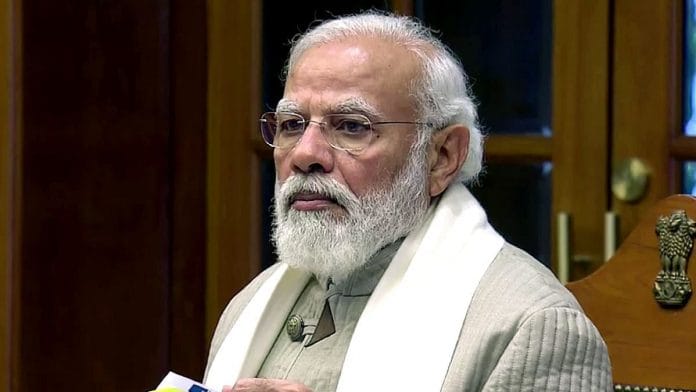New Delhi: The Narendra Modi government is planning to start an annual dialogue with the chief secretaries of all states to better understand the challenges they face, ThePrint has learnt.
During this dialogue, discussions will be held on the issues states experience across sectors, and solutions recommended to improve governance, three senior government officials aware of the developments said.
The first of these annual conclaves will likely take place next month and could be chaired by Prime Minister Narendra Modi himself. Although yet to be finalised, Dharamshala is the proposed location for the two-day meet being coordinated by the federal thinktank NITI Aayog. The tentative dates for the event are 16 and 17 June.
For the conclave, six broad themes have been finalised for deliberations, said the government officials. These are urban governance, implementation of the New Education Policy (NEP), water security, health and nutrition (Ayushman Bharat and Mission Poshan), crop diversification and self-sufficiency in oil seeds and pulses, and export promotion with a thrust on quality.
“It’s in keeping with the idea of cooperative federalism,” one of the senior officials told ThePrint, on condition of anonymity. “Annual conferences like this help both the states and Centre discuss various ideas to make governance effective. It will be along similar lines as the annual conference of the police chiefs.”
Another official clarified that it’s not as if interaction with chief secretaries of states and UTs does not happen. “But this is on a broader scale, where a host of issues will be deliberated upon. An annual interaction is a good idea,” the official added.
The preparations for this have been going on since last year. Several workshops and preparatory meetings have been held with NITI Aayog, different central government ministries, and officials from state governments.
Six groups have been formed, each headed by a state chief secretary and comprising central and state government officials and sectoral experts. Every group has been assigned one of the six themes.
“The groups have to prepare a concept paper on the subject and come up with suggestions. The group heads will make their presentations during the conference,” the third government official said.
Also read: Modi govt’s policies have brought an end to Nehruvian statecraft
‘Manner of implementation is key’
One of the government officials told ThePrint that the Modi government had experimented with a similar model at the Centre in 2016, when 10 groups of secretaries were set up to focus on key areas of governance.
Each group was given one sector to focus on, and was asked to come up with transformational ideas for them. The sectoral groups were reconstituted in 2019. Many of the recommendations made during the exercise have since been implemented, the official said.
Over the past two years, though, the Centre-state relations have been strenuous, with many Opposition-led states accusing the Centre of attempts to usurp their power.
Some states, including Maharashtra, Rajasthan and Punjab, have withdrawn their general consent for the CBI to probe cases in their jurisdiction. West Bengal, meanwhile, has been accused of not implementing central government schemes, an allegation denied by the Mamata Banerjee government.
Some senior state government officials remain sceptical about the planned annual conferences. A state chief secretary, who wished to not be named, said that the Centre has a tendency to take on a “big brother” role while dealing with states but, more often than not, such an approach does not work.
“Its success will depend on how these meetings are conducted,” the state chief secretary told ThePrint. “You can’t have a one-size-fits-all approach because the situation is different in every state.”
(Edited by Zinnia Ray Chaudhuri)
Also read: How rising Centre-state friction is chipping away at Modi’s ‘cooperative federalism’ mantra






